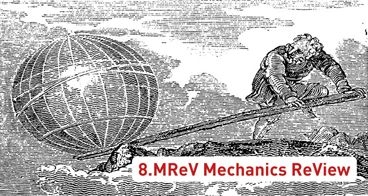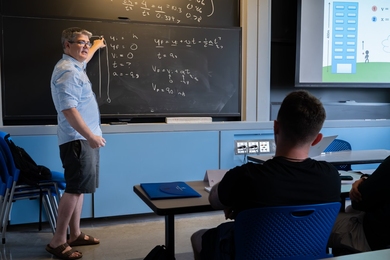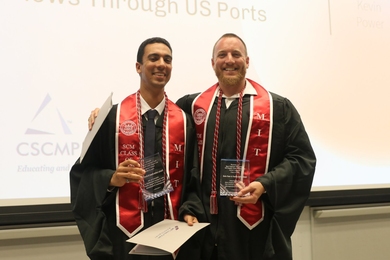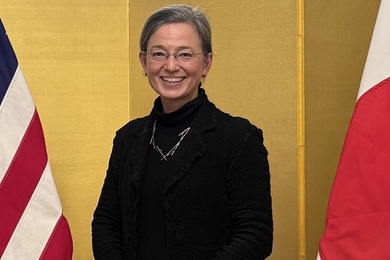A new MIT physics MOOC, Mechanics ReView, has a long history of development and a proven ability to help even struggling students master the material. Available for the first time on the edX platform starting June 1, this course has been offered in various incarnations and iteratively developed and improved over the past five years, both in class and online. The course uses a unique pedagogical model developed to help students learn more effective strategies for solving mechanics problems, a model that has been demonstrated in studies to improve student expertise in problem solving and provide skills that carry forward measurably into subsequent courses.
“We’ve been able to measure the difference this approach makes,” explains Professor David Pritchard, who developed the course. “We can see that the students move from a focus on formulas to a focus on underlying concepts, and develop better strategies for solving problems. And this is a skill that leads to significantly better performance in their next physics course.”
The course originated as a three-week January review of classical mechanics offered in 2009 to MIT students who struggled in first-semester physics course 8.01 Classical Mechanics. The review course was taught as a “flipped classroom,” using class time for teaching advanced problem-solving skills, while making the delivery of course material outside of class as efficient and effective as possible. The instructional team developed a series of sophisticated online supports for the class, using evidence-backed research and careful data analysis of student performance.
This material was then supplemented with homework of varying degrees of difficulty and offered as a highly successful free online course in the spring and summer of 2012. Previous offerings have generated impressive retention rates. In its most recent running (on the LON-CAPA platform) a record 74 percent of students attempting the second homework assignment stayed engaged with the course and received certificates, a rate rivaling on-campus retention. The course has proven very popular with high school physics teachers, and continuing education credit is available for the course at a modest fee through the American Association of Physics Teachers.
The course uses a carefully structured pedagogy called Modeling Applied to Problem Solving (MAPS). MAPS is a strategic, systematic approach to problem-solving based on categorization of student knowledge into models. The basic knowledge of Mechanics is represented as five core models, each of which specifies the types of system to which it applies, the interactions that change the motion, represented as the variable of interest (velocity, momentum, mechanical energy, angular velocity or angular momentum) and the equation governing that change. Students are then taught a systematic approach to problem solving called SIM, for System, Interaction and Model. SIM tells students to plan a solution based on explicitly picking a System, identifying the important Interactions and selecting an appropriate core Model.
The course also employs significant research to inform materials design. The frequent use of what are called "checkpoint" questions throughout the online e-text, for example, is based on evidence that the close interweaving of instruction and assessment substantially increases the amount of material read by each student and improves retention. Problem questions were drawn from a large pool of questions that had been pre-vetted by hundreds of other students for effectiveness. Computer-graded online homework replaced written homework, and videos featuring renowned professors, like Walter Lewin, are interspersed throughout.
Materials for Mechanics ReView were developed by the RELATE (Research in Learning, Assessing and Tutoring Effectively) research group at MIT, under the direction of Professor David Pritchard in MIT’s Department of Physics and Research Laboratory of Electronics.
“We’ve been able to measure the difference this approach makes,” explains Professor David Pritchard, who developed the course. “We can see that the students move from a focus on formulas to a focus on underlying concepts, and develop better strategies for solving problems. And this is a skill that leads to significantly better performance in their next physics course.”
The course originated as a three-week January review of classical mechanics offered in 2009 to MIT students who struggled in first-semester physics course 8.01 Classical Mechanics. The review course was taught as a “flipped classroom,” using class time for teaching advanced problem-solving skills, while making the delivery of course material outside of class as efficient and effective as possible. The instructional team developed a series of sophisticated online supports for the class, using evidence-backed research and careful data analysis of student performance.
This material was then supplemented with homework of varying degrees of difficulty and offered as a highly successful free online course in the spring and summer of 2012. Previous offerings have generated impressive retention rates. In its most recent running (on the LON-CAPA platform) a record 74 percent of students attempting the second homework assignment stayed engaged with the course and received certificates, a rate rivaling on-campus retention. The course has proven very popular with high school physics teachers, and continuing education credit is available for the course at a modest fee through the American Association of Physics Teachers.
The course uses a carefully structured pedagogy called Modeling Applied to Problem Solving (MAPS). MAPS is a strategic, systematic approach to problem-solving based on categorization of student knowledge into models. The basic knowledge of Mechanics is represented as five core models, each of which specifies the types of system to which it applies, the interactions that change the motion, represented as the variable of interest (velocity, momentum, mechanical energy, angular velocity or angular momentum) and the equation governing that change. Students are then taught a systematic approach to problem solving called SIM, for System, Interaction and Model. SIM tells students to plan a solution based on explicitly picking a System, identifying the important Interactions and selecting an appropriate core Model.
The course also employs significant research to inform materials design. The frequent use of what are called "checkpoint" questions throughout the online e-text, for example, is based on evidence that the close interweaving of instruction and assessment substantially increases the amount of material read by each student and improves retention. Problem questions were drawn from a large pool of questions that had been pre-vetted by hundreds of other students for effectiveness. Computer-graded online homework replaced written homework, and videos featuring renowned professors, like Walter Lewin, are interspersed throughout.
Materials for Mechanics ReView were developed by the RELATE (Research in Learning, Assessing and Tutoring Effectively) research group at MIT, under the direction of Professor David Pritchard in MIT’s Department of Physics and Research Laboratory of Electronics.






